From Monthly Film Bulletin , September 1976, Vol. 43, No. 512. — J.R.
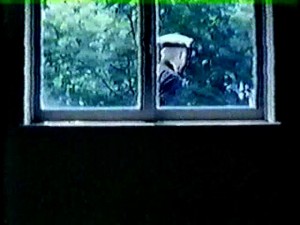
Director: Michael Snow
Canada, 1969
Dist–London Film-makers Co-op /Cinegate. conceived and executed by— Michael Snow. In colour. ed–Michael Snow. sd–Darvin Studio. with— Allan Kaprow, Emmett Williams, Max Neuhaus, Terri Marsala, Donna Aughey, Joyce Wieland, Louis Commitzer, George Murphy, Dr. Gordon, Liba Bayrak, Anne Scotty, Nancy Graves, Richard Serra, John Giorno, Paul Iden, Alison Knowles, Jud Yalkut, Susan Ay-O, Mac, students in the HEP program at Farleigh Dickinson University. 1,872 ft. 52 mins.
(16 mm.)
Alternative title—Back and Forth
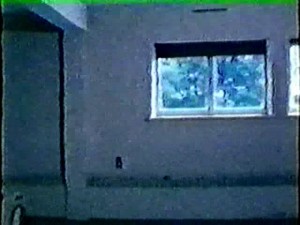
The camera pans back and forth across an outside wall of a classroom while a man crosses part of the field. The pan resumes inside the classroom in a fixed trajectory, revealing an asymmetrical area including part of a blackboard and a door on a far wall, two pairs of windows on the wall closer to the camera, and desks in front of the blackboard; trees, building and occasionally passing vehicles are partially visible through the doors and windows.
Throughout, one hears the sound of the camera’s mechanisms, including a loud report at the beginning and end of each pan. Various cuts emphasise that certain parts of individual pans, or entire pans, or a number in series, were filmed at different times. Read more
From the Chicago Reader (July 22, 1994). — J.R.
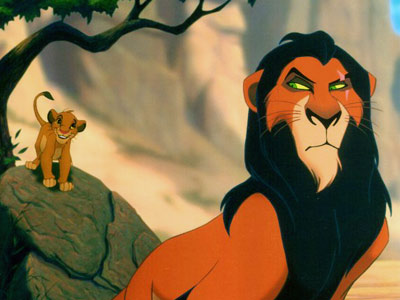
** THE LION KING
(Worth seeing)
Directed by Roger Allers and Rob Minkoff
Written by Irene Mecchi, Jonathan Roberts, and Linda Woolverton
With the voices of Matthew Broderick, James Earl Jones, Jeremy Irons, Rowan Atkinson, Moira Kelly, Jim Cummings, Whoopi Goldberg, and Cheech Marin.
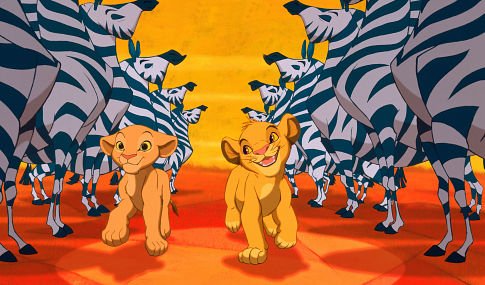
Though it’s somewhat less entertaining than The Little Mermaid, Beauty and the Beast, and Aladdin, The Lion King marks a welcome and fascinating shift in the Disney animated feature. It may be just a coincidence, but Disney’s new live-action Angels in the Outfield, a multicultural remake of a 1951 baseball fantasy, marks the same kind of racial and ethnic reorientation. I’d like to think that the widespread (and justifiable) objections raised by Middle Eastern groups to the xenophobic stereotypes in Aladdin have finally led to some rethinking by Disney executives about how to handle such ethnic material. If my hunch is correct, these changes represent not so much a kowtowing to political correctness as a more accurate reckoning of Disney’s stateside and international audience.
The issue isn’t exactly reality versus fantasy, because all Disney pictures are fantasies. In real life a white orphan isn’t likely to be adopted by a black man even if the white orphan’s best friend is a black orphan who comes along with the bargain (as in Angels in the Outfield). Read more
From Monthly Film Bulletin, January 1976, Vol. 43, No. 504. — J.R.
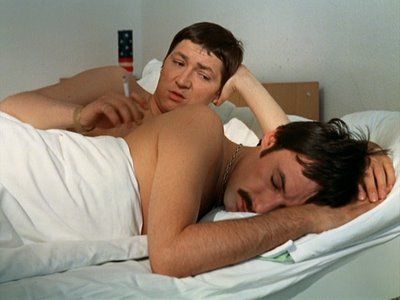
Faustrecht der Freiheit (Fox)
West Germany, 1975
Director: Rainer Werner Fassbinder
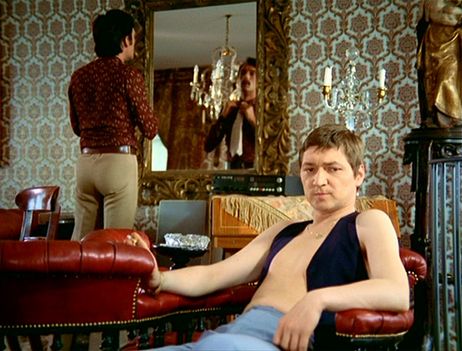
Ce r t–X. dist–Cinegate. p.c–Tango-Film. p–Rainer Werner Fassbinder. p. manager–Christian Hohoff. asst. d–Irm Hermann. sc—Rainer Werner Fassbinder, Christian Hohoff. ph–Mictrael Ballhaus. col–Eastman Colour. ed–Thea Eymèsz. a.d–Kurt Raab. m–Peer Raben. songs–“One Night” by Pearl King, Dave Bartholomew, performed by Elvis Presley; “Bird on the Wire” by and performed by Leonard Cohen. l.p–Rainer Werner Fassbinder (“Fox” Franz Biberkopf), Peter Chatel (Eugen Theiss), Karl- Heinz Böhm (Max), Harry Bär (Philip), Adrian Hoven (Eugen’s Father), Ulla Jacobsen (Eugen’s Mother), Christiane Maybach (Hedwig), Peter Kern (Florist “Fatty” Schmidt), Hans Zandler (Man in Bar), Kurt Raab (Barman Springer),Irm Hermann (Mlle. Chérie de Paris), Barbara Valentin (Max’s Wife), Walter Sedlmayr (Car Dealer), Ingrid Caven (Singer in Bar), (El Hedi Ben Salem (Moroccan), Brigitte Mira (Shopkeeper),Bruce Low (Soldier), Ursula Strätz, Elma Karlowa, Evelyn Künneke, Marquart Bohm, Liselone Eder, Klaus Löwitsch.
11,077 ft. 123 mins. Subtitles.
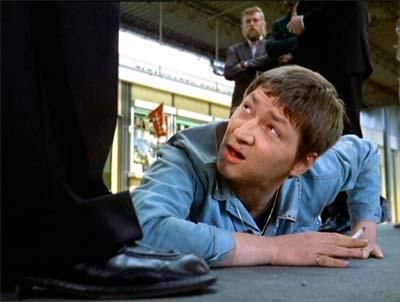
“Fox” Franz Biberkopf, a carnival sideshow performer, loses his job and his lover Klaus (who runs the show) when the latter is arrested. Read more







